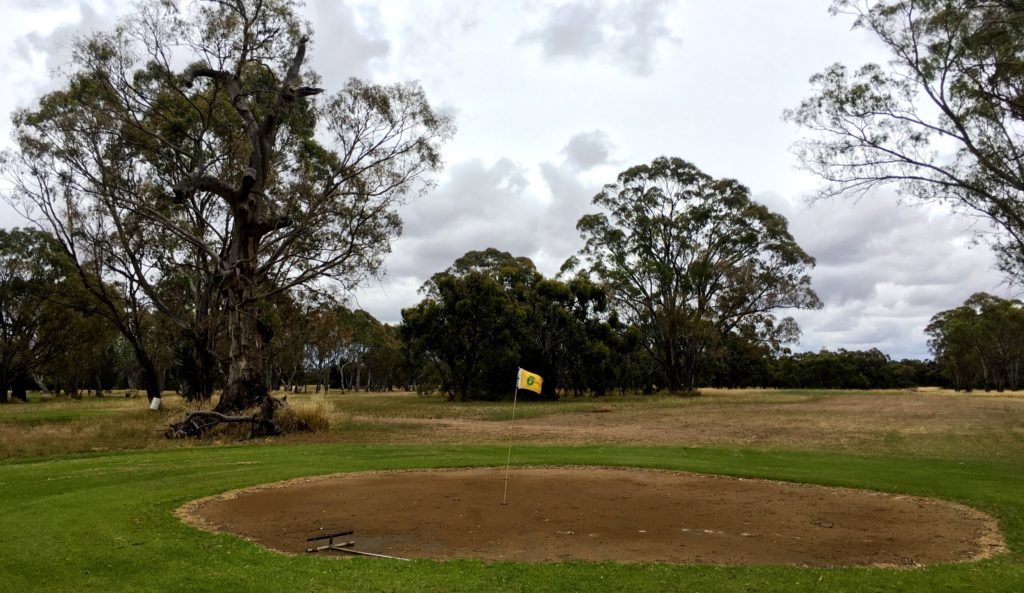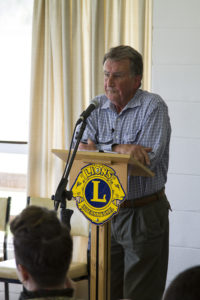Australian writer Gerald Murnane is a man of profound contradictions. A recluse who craves attention. A Luddite who uses his smartphone to Google himself. An author who retired long ago then went on to produce his richest work. He was recently treated for prostate cancer, and yet he’s still the sprightliest person in the room.
The room on this occasion was a small golf club in Goroke—Murnane’s rural home town in Victoria, Australia, not far from the state border. We had gathered from faraway places for Another World in This One, a one-day symposium on Murnane’s fiction, and to mark the publication of what is by every account his final novel, Border Districts.
The club was furnished with vinyl chairs and tables with the covers tacked on. It had views of the golf course, the flags for each distant hole waving between spindly gumtrees. The attendance for the symposium was capped at forty people—the club is cozy and the kitchen only able to turn out so many scones and sandwiches. Attendees included Murnane’s tireless publisher at Giramondo, Ivor Indyk, Alexis Wright (another of Australia’s major writers), academics, poets, and passionate readers. Rumors abounded that noted fan J.M. Coetzee was due to make the drive from Adelaide. That he had other engagements was perhaps for the better—his presence would have been too much for the little golf club to bear.
The Wimmera, the district the town of Goroke is a part of, is the furthest point on the plains of Murnane’s fiction. It is the kind of place where the men in the pubs can tell at a glance that you’re not from around here. So can the frogs—the night before the symposium, we drank on the main street of a nearby town and one jumped into my lap. Before the conference, the organizers at Western Sydney University emailed to say the region’s cellular network was down and to study the map before we set out. The land smooths over long before Goroke, but it isn’t till Goroke that it turns the color of straw and seems to unfold.
The symposium began with organizer Anthony Uhlmann reading out a prepared statement from Murnane while the writer stood by tight-lipped: he would be present in the breaks and at the end of the day, but was under no obligation to stay for the papers. Murnane didn’t stay, at least not for the first session. In the second session he lingered in the bar, pretending to read the newspaper. In the third, he collected empty beer glasses and tinkered at the sink. He seemed to be ignoring references to his presence until, during Indyk’s paper, the publisher mispronounced Feversham’s Fag, a novel by John Mowbray referenced in A History of Books. Murnane called out to correct him.
Even though his oeuvre demonstrates a deep unity, Murnane’s writing life can still be split into two distinct parts. Underlying the first part is instability—his first seven books were published locally by different publishing houses, each more baffled and antagonistic to the writing than the last. The lack of attention to his artistic vision both from publishers and from the Australian reading public prompted Murnane to retire from writing for publication altogether. His obsessive and distinctive literature, created almost entirely out of personal “mental imagery” that ranges from marbles and the silks of racehorses to Catholic iconography and the rolling plains of his home state, would have disappeared into obscurity entirely if not for the promptings of Indyk at Giramondo. The second part, then, is characterized by certainty—with the support of a trusting publisher, Murnane could explore the images that preoccupy him in full. This narrow yet entirely unexpected body of work has finally started to find readers around the world.
Murnane’s biographer Shannon Burns presented Murnane’s literature as one of failure, proposing it is this that is both a source of humor in his writing, but also the thing that keeps him writing. Or, more correctly, kept him writing. Murnane hasn’t written anything new since 2015 and stated, in his paper and in private, that he again has lost the desire to continue.
During the lunch break, Murnane opened the bar and served drinks: $2.00 for a can of Coke, $4.50 for a bottle of Carlton Draught. He is the club’s barman—an ideal position for receiving horseracing tips—as well as its secretary. On the end of the bar were copies of two items lifted from his archives, to be consumed in the breaks with tea and cake: an exam he sat during his undergraduate degree and a palindrome of 1,600 words beginning, “Do good, dog-god! Do, o god! Do!”
In his presentation, Uhlmann observed that Murnane’s images are not just images but are laden with meaning. Though Murnane is repelled by psychoanalysis and doesn’t believe in the idea of the unconscious, his fiction is full of the slow uncovering of the secret meanings hidden in the imagery. When it was Murnane’s turn to speak, he stood at the lectern with his hands behind his back and offered an updated reading of ‘The Breathing Author’ titled ‘The Still-breathing Author’. The original paper, delivered in 2001, would mark both his return to publishing and the beginning of his “post-break” career. The symmetry was not lost on anyone in the room, least of all Murnane. As he did back then, he used this occasion to reinforce some of the Murnane mythologies: the young author of Tamarisk Row never planned to retire as the old author of Border Districts; academics and critics complicate his simple ideas; he doesn’t go in search of images, they come to him. Murnane doesn’t like being put into a category but stated that, if pushed, he would call himself a “technical writer”; as if for proof, he held up a diagram illustrating one of his stories—a wobbly parallelogram with lines from the elements on each corner linking to one major element in the centre. It could have been a map of the nearest horse racing tracks as much as a plan for a piece of fiction. To reiterate that his writing was finally finished, he quoted Thomas Hardy: “I have been delivered of my books.” During his talk, it started to rain.
In the documentary Mental Places, Murnane quotes the name of a file in his archive: “I am a very strange fellow.” Which he is—as strange as a literary symposium in a country town golf club. But not so strange that he was blind to the importance of what was taking place here; as the end of his paper approached, Murnane’s chin quivered, his voice rose and he shook a fist like a jockey clenching a riding crop. When it was over, he thanked us for coming then went back behind the bar—to serve drinks and sign the odd book.
The rain continued to fall as we went back across the plains. It didn’t feel like a goodbye, nor the last time we would see the old writer. We had all begun our prayers for a third coming sooner rather than later.
Tristan Foster is a writer from Sydney, Australia. He is co-editor-in-chief of 3:AM Magazine. His short story collection Letter to the Author of the Letter to the Father is forthcoming from Transmission Press.
from The Paris Review http://ift.tt/2EaVbgY


Comments
Post a Comment